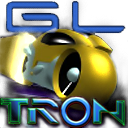| GLtron | |
|---|---|
 | |
| Original author | Andreas Umbach |
| Developer | GLtron.org |
| Initial release | 1999 |
| Stable release | 0.72-beta-8 / 31 July 2016 |
| Repository | https://sourceforge.net/projects/gltron |
| Platform | OS X (OS X 10.7+ currently unsupported), Mac OS 9, Linux, Windows, MorphOS, Symbian, Android |
| Type | Snake game |
| License | GPL-2.0-or-later |
| Website | www |
GLtron is a 3D snake game based on the light cycle portion of the film Tron . [1] The game is free and open-source software and has been ported to many mobile and non-mobile operating systems such as Windows, MacOS, Symbian [2] and Android [3] over the years.
